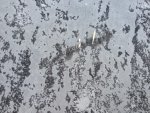background - had my pool marble dusted (re-plastered) in mid may this year. i kept it w/o salt water for about a month and a half. everything seemed great except i had a hard time keeping the ph down. was adding about a quart a week it felt like. it stabilized a little better by Sept, but still needed some every week. and then..
i had to be out of town from about late sept to early nov. i usually do my own maintenance, but wanted to have someone take care and close it while i was away. unfortunately there was a mix up and nothing was done for the month and a half. so i balanced the water, and started cleaning/closing. the solar cover was on and the pump was running so it actually was not too bad. however the ph was way too high and both TA and calcium were at upper recommended range. i balanced (took a gallon of acid) and once i started draining i spotted what looks like cracks with some form of hard mineral looking substance coming out of the crack (pic attached - note 2 things 1. i was hanging upside down so the pick is upside down 2. i have grey plaster with a molten look so the strange color is fairly normal except it looks like it faded a bit from May). on closer inspection i also noticed that the plaster was very, very rough. it looked like there was hardened, coarse grain salt stuck to the plaster everywhere. it does scrap off with a bit of sandpaper and elbow graese but i couldn't imaging wet sanding the entire pool.
any ideas of what to do now? i've balanced and drained/covered for winter but am stressed thinking that i'm going to have to pay for another plaster job next year!
any help is greatly appreciated.
i had to be out of town from about late sept to early nov. i usually do my own maintenance, but wanted to have someone take care and close it while i was away. unfortunately there was a mix up and nothing was done for the month and a half. so i balanced the water, and started cleaning/closing. the solar cover was on and the pump was running so it actually was not too bad. however the ph was way too high and both TA and calcium were at upper recommended range. i balanced (took a gallon of acid) and once i started draining i spotted what looks like cracks with some form of hard mineral looking substance coming out of the crack (pic attached - note 2 things 1. i was hanging upside down so the pick is upside down 2. i have grey plaster with a molten look so the strange color is fairly normal except it looks like it faded a bit from May). on closer inspection i also noticed that the plaster was very, very rough. it looked like there was hardened, coarse grain salt stuck to the plaster everywhere. it does scrap off with a bit of sandpaper and elbow graese but i couldn't imaging wet sanding the entire pool.
any ideas of what to do now? i've balanced and drained/covered for winter but am stressed thinking that i'm going to have to pay for another plaster job next year!
any help is greatly appreciated.


